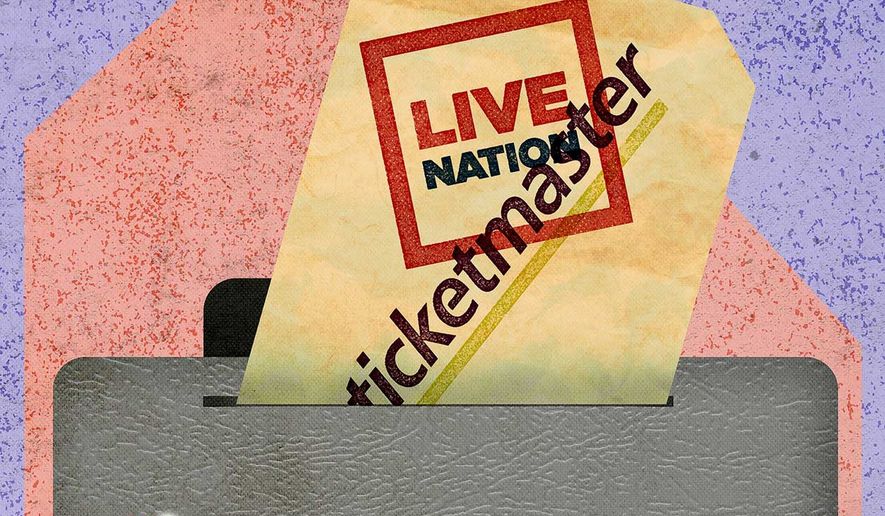OPINION:
One thing every American can agree on: Ticketmaster is horrible, bordering on criminal.
Take the recent Rod Wave concert at Capital One Center in Washington. Tickets in a nosebleed section, about as far away as you can be, were going for $158.75, so that’s $317.50 for a pair. Why so much? Partly this:
Service fee: $24.10 x 2 = $48.20.
Facility charge: $4.00 x 2 = $8.00.
Order processing fee = $6.00.
Total, $379.70. But if you wanted to see him — without binoculars — a pair of seats down on the floor (nowhere close to the front row) would’ve set you back nearly $840.
I’ve got my own disgust with ticket prices. Back in 1975, I saw the Rolling Stones shortly after they released their now classic album “It’s Only Rock ’n’ Roll.” The ticket cost $9.50. Sure, that’s $51.01 in today’s dollars, according to the U.S. Bureau of Labor Statistics, but it ain’t hundreds or thousands.
But when I caught the Stones in Philly last year (they didn’t play D.C., and I’ve seen them in the ’70s, ’80s, ’90s, ’00s and ’10s, so I needed a ’20s show), I paid more than $600 for after-market tickets (again, just for decent seats).
Here’s how bad things are: I completely agree — for the first time ever — with Rep. Alexandria Ocasio-Cortez, the Democratic socialist from New York.
AOC came out against the concert ticket monopoly last week after the sale of Taylor Swift tickets turned into a debacle, leaving thousands of fans frustrated and prompting scalpers to jack their prices into the tens of thousands.
“I was watching what was going on with the pre-release of Taylor Swift’s tickets,” she told Rolling Stone. “It came up on a more personal level; I actually have quite a few staff who were trying to get tickets that day. Between seeing their experience and seeing all the people online talking about it, I think it really showed how widespread the problem is and reflects the degree of market consolidation in this industry.”
That’s exactly correct. Ticketmaster and Live Nation merged in 2010, and it’s been a mess ever since. Ticketmaster controls the tickets, and Live Nation often owns the venue, which means they’ve got you.
“One of the things we’ve been increasingly seeing is that these price increases because of inflation and abuse of market power are due to market consolidation,” Ms. Ocasio-Cortez said. “It’s gotten so bad that we’re really seeing it affect our everyday lives, from how much we’re paying at grocery stores to not being able to see our favorite artists without paying an arm and a leg.”
And finally — finally — the Department of Justice announced it is opening an inquiry into the monopoly.
“The Justice Department has opened an antitrust investigation into the owner of Ticketmaster, whose sale of Taylor Swift concert tickets descended into chaos this week, said two people with knowledge of the matter,” The New York Times reported. “The investigation is focused on whether Live Nation Entertainment has abused its power over the multibillion-dollar live music industry.”
But Democratic Sens. Richard Blumenthal of Connecticut, Amy Klobuchar of Minnesota and Edward J. Markey of Massachusetts wrote a letter to the attorney general saying that’s not enough, noting that “an investigation alone does nothing for the stakeholders already harmed by Live Nation’s market dominance and seemingly ongoing anticompetitive behavior.”
They said the company, which controls about 60% of the market — including many of the biggest venues — “has continued to abuse its dominant market position,” adding that “we urge the Department to consider unwinding the Ticketmaster-Live Nation merger and breaking up the company.”
Ms. Ocasio-Cortez was right again when she talked about what the monopoly does to the average family.
“It’s getting to a point where if you want to see one of these large acts, there’s so little protection for everyday people that if you go into a secondary market, we are no longer in this realm of someone even charging double of what a ticket was. Tickets are going as high [as tens of thousands of dollars] after what was supposed to be a presale operation designed for people who are actually going to be using the tickets that they purchase.”
And she was right again when she said: “Other industries have oligopolies; Live Nation is a true monopoly. And it’s affecting our culture if regular people can’t even see a live show for a major act in person anymore, and this just becomes a domain for the wealthy.
“I think that that’s also something to consider because If you can’t even see your favorite artists without paying [the equivalent of] a down payment on a house or a car, it’s so antithetical to what music really is,” she said.
• Joseph Curl covered the White House and politics for a decade for The Washington Times. He can be reached at josephcurl@gmail.com and on Twitter @josephcurl.




Please read our comment policy before commenting.